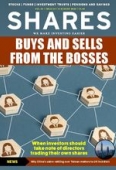Archived article
Please note that tax, investment, pension and ISA rules can change and the information and any views contained in this article may now be inaccurate.
Buys and sells from the bosses: When investors should take note of directors trading their own shares

When a director of a firm sells shares there could be any number of reasons for their decision, the most common one being they need to raise cash to pay an income tax or capital gains tax bill.
However, when a director dips into their own pocket to buy shares there is usually only one reason – they expect the price to go up.
The question is, can investors rely on insider buying as a useful tool when trying to pick stocks?
‘THE ILLUSION OF CONTROL’
We should stress that when we say insider buying or selling we aren’t referring to insider trading, which is based on having specific, unpublished, price-sensitive information, and is strictly banned by the FCA (Financial Conduct Authority).
What we are talking about is directors buying or selling shares in their own company completely off their own bat on the basis that they are either too cheap or too dear.
Tom Stevenson, investment director at US asset manager Fidelity International, cautions that insiders can suffer the same emotional biases as any other investor and can often be ‘too quick out of the blocks when it comes to buying their companies’ shares’.
Studies show that more often than not managers are over-confident about the future returns from their companies’ shares.
‘One study asked finance directors on a quarterly basis how confident they were about both the economy and their own company’s prospects,’ relates Stevenson.
‘The study found they were routinely more confident about their company than the economy as a whole – a classic case of overconfidence springing from the illusion of control,’ he adds.
Elon Musk, chief executive of Tesla (TSLA:NASDAQ) and its biggest shareholder, certainly couldn’t be said to lack self-confidence.
Musk’s purchases of Tesla stock in 2018 and 2020 created plenty of headlines but they didn’t have much of a positive effect on Tesla’s shares and they didn’t add any value for shareholders.
Stevenson also suggests looking at the amounts of money involved relative to the wealth of the investor.
For multi-billionaire owners, spending £10 million or $10 million on their own shares may be a drop in the ocean, whereas for most normal people it is a fortune.
Moreover, wealthy owners can afford to sit on losses for a long time whereas most of us don’t have that luxury.
THE MORE THE MERRIER
However, when a group of insiders buy shares in the same company – what is known as a ‘cluster-buy’ or ‘pack buy’ – it is often considered a strong signal.
When one director buys it might be because they are optimistic about the future, but when half a dozen top executives buy at the same time it usually means they have a fairly good idea there is positive news on the way.
Often, buying by independent directors can be a good indicator, especially if they come from an investment background, as they tend to take a more objective view of the business than people who have worked for the firm for a long time.
Also, investors should look at the broader context, says Stevenson.
‘Are similar insider buys going through in other companies in the sector? This might indicate a change in sentiment in an out of favour industry.’
The fact more directors were buying shares than selling them in May – for the first time since the onset of the pandemic in March 2020 – could be a signal things are looking up, says Stevenson.
‘Insider buyers can be a powerful leading indicator of a change in direction for the market,’ he adds, which alongside what looks like a change in the tide of markets, could be an encouraging sign.
A RELIABLE SIGNAL?
While Shares has found no concrete evidence that following directors buys and sells is a good lead indicator of future share price returns, one study is worth flagging.
In their paper Trading Against the Grain: When Insiders Buy High and Sell Low, published in the Journal of Portfolio Management in 2019, authors Wesley Wang, Zhipeng Yan and Qunzi Zhang studied US director share deals stretching from 1986 to 2017.
The authors found that, for all their supposed informational advantage, directors tended to have exactly the same behavioural biases as normal investors.
For instance, the closer a stock price got to a 52-week low, the more likely directors were to buy shares in their own companies, and the closer it got to a 52-week high the more likely they were to sell.
This is a classic example of ‘anchoring’ an investment decision based on the price of a stock. All investors are ingrained with the lesson they should ‘buy low, sell high’.
As a result, insiders were progressively less likely to buy or sell the further the price moved from the 52-week low or high.
THE CONTRARIAN VIEW
However, the study’s most intriguing finding was that when directors went completely against the grain and bought shares close to their 52-week highs or sold shares close to 52-week lows, it was because they were typically better informed.
‘Corporate insiders are actively involved in the operations and management of their firms, which help them enjoy certain informational advantages over outside investors,’ say the authors.
‘Except for meeting instant liquidity needs, insiders trade under the influence of both the anchoring bias and private information; if the insider actually trades against the bias, we can infer that this type of insider trades may contain information,’ they suggest.
They go on to argue that outside investors can ‘piggyback on insiders following these informative trades and reap sizeable abnormal returns’.
According to their analysis, a long-short trading strategy of buying high and selling low along the lines of insiders and riding the price momentum generated an average monthly excess return of around 200 basis points or 2% before dealing costs.
While 2% per month before costs may not sound much, it adds up to an annual return of 24% which is more than the stock market has returned annually over any five-year or 10-year period.
WHERE CAN I FIND DETAILS OF INSIDER DEALS?
The Shares website has details of all director deals reported to the London Stock Exchange.
Under Tools, on the home page, subscribers can click to see all the latest director deals as well as search for deals by company.
In addition, subscribers can discover which directors have been the most active in terms of number of deals in the last month, three months, six months or year, and which have been the biggest buyers or sellers in terms of total consideration.
There are also tabs for contrarian buys, ‘cluster’ or ‘pack’ trades – when more than one insider buys or sells together – and the most profitable trades.
For subscribers who want to analyse buys and sells near 52-week highs and lows and test the theory set out in the paper above, that facility is also available under the ‘Analysis’ tab.
REAL-WORLD EXAMPLES
Some recent significant trades in terms of size include a £10 million deal linked to the CEO of retailer Next (NEXT), Simon Wolfson.
The shares were bought through a charitable trust linked to Wolfson and imply a degree of confidence in the outlook for the company despite an extremely difficult backdrop.
At a purchase price of £60.95, the shares were bought a long way from 52-week highs of £84.84 and not a million miles from year lows of £55.78. As we write the shares are trading at £64.70, buoyed by an encouraging set of first-half numbers published on 4 August.
To illustrate the point that there are lots of reasons why directors might sell, several board members at competition runner Best of the Best (BOTB:AIM) recently sold shares as part of a tender offer (where shareholders have the opportunity to sell shares at a specified price, in this case 600p).
A big sale by the CEO of consumer credit reporting outift Experian (EXPN), Brian Cassin, was to cover tax liabilities associated with a share award.
Swedish businessman Jorn Hausing, an early investor in online groceries firm Ocado (OCDO) and a non-executive director on the board, added to his already significant stake in the business with a couple of significant purchases in May 2021. At the time the shares were trading close to a 52-week high.
In the short term this trade has performed poorly with the shares having halved in the interim.
In contrast, Tony Griffin, a director at veterinary medicines group Dechra Pharmaceuticals (DPH) sold nearly £1 million shares at what was close to a one-year low and while the shares did subsequently rally in the short term. They now trade below the price at which he sold.
Important information:
These articles are provided by Shares magazine which is published by AJ Bell Media, a part of AJ Bell. Shares is not written by AJ Bell.
Shares is provided for your general information and use and is not a personal recommendation to invest. It is not intended to be relied upon by you in making or not making any investment decisions. The investments referred to in these articles will not be suitable for all investors. If in doubt please seek appropriate independent financial advice.
Investors acting on the information in these articles do so at their own risk and AJ Bell Media and its staff do not accept liability for losses suffered by investors as a result of their investment decisions.
Issue contents
Exchange-Traded Funds
Great Ideas
News
- US investors chase former ‘meme’ stocks and heavily-shorted shares
- Tesla to do the splits for second time in two years as stock price soars
- Why China’s sabre-rattling over Taiwan matters to UK investors
- Why Next wants to own part of struggling retailer Joules
- Fundsmith among the funds hit by £4.5 billion outflows in June

 magazine
magazine








